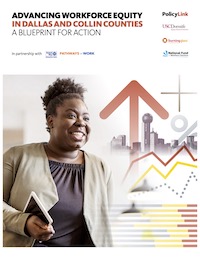In Dallas and Collin counties, Texas, as in the rest of the nation, deep racial inequities are built into the regional economy. Occupational segregation is ubiquitous and the impact is widespread. Black workers in Dallas and Collin Counties are about 18% of the total workforce but almost half (48%) of healthcare support workers and just 12% of both computer and mathematical jobs and management positions.
In 2018 alone, racial gaps in wages and employment for working-age people cost the region more than $115 billion in lost GDP. Inequities in the system are felt by the whole region, but workers of color are bearing the burden.
This report, produced in partnership with PolicyLink, Burning Glass Technologies, and Pathways to Work at the United Way of Metropolitan Dallas, offers a comprehensive analysis of long-standing racial gaps in labor market outcomes, the economic impacts of Covid-19, and the racial equity implications of automation.
The report offers the following agenda for funders, employers, and community organizations to build a thriving and inclusive regional workforce:
- Create good jobs and improve the quality of existing jobs.
- Use skills-based hiring, retention, and advancement strategies to reduce occupational segregation.
- Align workforce development and worker rights efforts to improve basic protections and increase opportunities for advancement.
- Coordinate with the local housing systems to ensure access to good jobs in affordable neighborhoods.
You can find additional materials for this report at our partner PolicyLink’s website.



